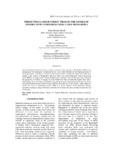| dc.contributor.author | Ghosh, Suntu Kumar | |
| dc.contributor.author | Khabir, Md. Latiful | |
| dc.contributor.author | Islam, Mohammad Thoufiqul | |
| dc.date.accessioned | 2011-05-05T09:32:36Z | |
| dc.date.available | 2011-05-05T09:32:36Z | |
| dc.date.issued | 2010 | |
| dc.identifier.issn | 1811-3079 | |
| dc.identifier.uri | http://hdl.handle.net/10361/898 | |
| dc.description.abstract | Industrial dispute has been touted as a major constraint in the economy of Bangladesh. While poor management and inadequate institutional factors were widely blamed for the high propensity of industrial dispute, formation of workers’ behavioural intention of industrial dispute has hardly been studied in the context of Bangladesh. Based on three cases from Bangladesh Export Processing Zone (BEPZ), we apply theory of planned behaviour to identify what are the factors that influence the propensity of workers to engage in violent behaviour when an industrial dispute takes place. Our findings show that, behavioural beliefs and attitude towards formal industrial dispute resolution and perceived behavioural control strongly influence the behaviour of the workers, while subjective norms also have an influencing power, albeit is a lesser capacity. Some alternative dispute resolution techniques along with future directions for research were also provided towards the end of the paper. | en_US |
| dc.publisher | BRAC University | en_US |
| dc.relation.ispartofseries | BRAC University Journal, BRAC University;Vol. 7, No. 1 & 2, 2011, p. 23-32. | |
| dc.subject | Industrial dispute | en_US |
| dc.subject | Theory of planned behaviour | en_US |
| dc.subject | Alternative dispute resolution | en_US |
| dc.subject | BEPZA | en_US |
| dc.title | Predicting labour unrest though the lenses of theory of planned behevior : cases from BEPZA | en_US |
| dc.type | Article | en_US |

